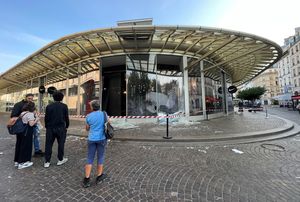The week of protests across France and neighbouring Belgium has certainly ruined the summer for those thronging to Europe. All the more so as the protests are taking place in all the posh areas, and not the far-out suburbs where most tourists barely venture to. But why, and why are the dissidents trashing and looting high-end retail stores like Louis Vuitton and Nike?
It is ironic that a country that is known as the land of luxury actually loathes its rich. Each time there are riots in France one is reminded of the French Revolution when an armed mob stormed Bastille and eventually brought an end to the lavish spending and decadent lives of the monarchs. The last queen of France, Marie Antoinette, may be wrongly credited to have said, “If they have no bread, let them eat cake”, but the French have certainly made a habit of eating their rich instead.
Last week, a 17-year-old delivery boy of Algerian origin, Nahel, was killed by a police officer for running a red light and trying to escape the cops. The death has caused riots against racism that the protestors believe is empowered by the government. The rioters have looted items worth millions from designer stores like LV, Nike and Zara, and smashed the windows of the Apple store in Paris.
The French president Emmanuel Macron, often called the ‘President of the Rich’, attended an Elton John concert in Paris with his wife Brigitte. The president, a former banker who made millions before he turned 40, is said to favour the rich while ignoring the economic conditions of the working class.
Much like India today, France has a growing number of billionaires while the poor struggle for their daily bread. The richest man and woman in the world, according to the Forbes Billionaires List, are both French—Bernard Arnault, the head of the luxury conglomerate LVMH, and L’Oreal heiress Francoise Bettencourt Meyers. The Macron government has raised the retirement age in France from 62 to 64 (without the parliament’s vote) to save on pension and other retirement benefits. The French believe big businesses are contrary to the country’s socialist reforms, and they are probably right. The tycoons earn more per minute than much of France earns in a lifetime.
Post pandemic, LVMH shares grew by 26 per cent while Arnault became the richest man in the world. He is especially loathed for his lifestyle; he lives in a 150-year-old castle in Bordeaux, owns super yachts, a private aircraft and an island in the Bahamas.
French presidents and billionaires are good friends. Nicolas Sarkozy had Arnault as his best man when he married supermodel Carla Bruni. Sarkozy is still a close confidant of Macron despite being kicked out of government on corruption charges. French leaders are seen as lackeys of multi-billionaires such as Arnault, Francois Pinault of Kering, and media mogul Vincent Bolloré.
The Paris Couture Week, which started on July 3, took place amid fear. Two Indian designers, Rahul Mishra and Gaurav Gupta, are showing here and both arrived in Paris. The head of French label Celine—the genius that is Hedi Slimane—cancelled his show on July 2 saying it would be “inconsiderate” to host a show when Paris was “bereaved and bruised”.
The irony is not lost that the biggest spenders at the Paris Couture Week (and much of Paris too) are the Saudis. Mohammed Ashi is the first designer from Saudi Arabia to be showing at this season’s Couture Week.
@namratazakaria


